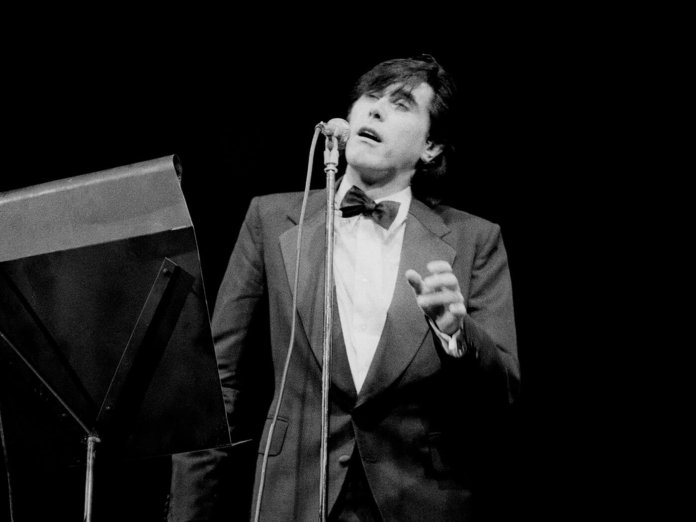Before an unapologetic pursuit of a debonair playboy lifestyle became more of a talking point than his music, Bryan Ferry was nigh-on untouchable. By the time this album was recorded, he had, in a little over two years, made four blow-your-head-off albums with Roxy Music and released two hugely popular solo albums.
The first, These Foolish Things, came out in October 1973, two weeks before David Bowie’s Pin-Ups, similarly an album of cover versions. Bowie’s retrospective focus on Pin-Ups was narrow: his beat-boom favourites, a little psychedelia, mainly British, mostly lacklustre. These Foolish Things, on the other hand, was a triumph; a brilliant pop art collage, a Warholian blending of high and low art that set Bob Dylan’s protest anthem “A Hard Rain’s A-Gonna Fall” against Lesley Gore’s pop sulk “It’s My Party” and found one as valid as the other. Elsewhere on the album, Ferry covered the Stones, Smokey Robinson, Elvis Presley, The Beatles and The Beach Boys with wit, affection and a refreshing lack of reverence.
His second solo album, Another Time, Another Place, released in July 1974, was a less successful mix of covers, ineffable cool giving way a little too often to suave incorrigibility, one raised eyebrow too many. The album cover, a shot of Ferry dressed as if for dinner on a millionaire’s yacht, inspired much ridicule, with greater derision to follow.
Ferry’s plan to make his solo debut at the Royal Albert Hall in January 1974 was scuppered by a temporary ban on rock and pop acts. Eventually, a three-date solo tour was booked for November, almost immediately following Roxy’s two-month Country Life UK tour. He put together quite an ensemble for the solo shows: a core band of guitarists Phil Manzanera and John Porter, drummer Paul Thompson, bassist John Wetton and Eddie Jobson on violin and piano was supplemented by an 18-piece orchestra, two keyboard players, a percussionist, three female backing singers and a horn section.
On consecutive nights, they played Newcastle, Birmingham and London, rocking up at the Albert Hall on November 19. The live album recorded that night and now released 45 years on, isn’t quite a full account of the concert. The original setlist included three songs from Another Time, Another Place – covers of “You Are My Sunshine”, Willie Nelson’s “Funny How Time Slips Away” and Kris Kristofferson’s “Help Me Make It Through The Night”. Otherwise, an often wildly exciting night is thrillingly recalled.
The album opens with Ferry’s bold appropriation of “Sympathy For The Devil”, an already cresting wave of power chords, thunderous drums and percussion, the siren wail of the backing vocalists. Ferry’s at the centre of the delirium, a stoic mariner lashed to a mast in the pitch and roil of a mighty storm, not a hair out of place. He plays the song’s amoral narrator with dramatic aplomb, enunciating every word like a Bond villain stroking a cat or Alan Rickman or Jeremy Irons in full international-terrorist-of-indeterminate-origin mode. “I Love How You Love Me”, a nod to early Phil Spector, is swooning, almost devotional, despite the louche horns. Elvis’s “Baby I Don’t Care” is a glam-rockabilly stomper whose velocity inclines to the same kind of hysteria also apparent on a virtually untrammelled version of “Fingerpoppin’”. “It’s My Party” is brasher, more strident than the These Foolish Things version, with blasting horns and shrieking backing voices, taken at the breathless clip of Roxy live favourite “Editions Of You”.
The Beach Boys’ “Don’t Worry Baby”, meanwhile, is rendered magnificently, Ferry’s voice rising above lachrymose strings and mistily ethereal backing vocals, Manzanera weighing in with two beautifully wrought solos. The versions that follow of a string-drenched “Smoke Gets In Your Eyes” and a powerfully put “Tracks Of My Tears” are likewise invested by Ferry with a morbid insecurity, a raw desolation at odds with his reputation for emotional detachment, practised aloofness, whatever. There’s real heartbreak here. The version of The Beatles’ “You Won’t See Me” is brittle, but worth it for another striking Manzanera solo. Among the covers are two Ferry originals: “A Really Good Time”, from Country Life, but not played on the recent Roxy tour, and “Another Time, Another Place” are fraught with regret, an anxious nostalgia.
Ferry’s outrageous reconstruction of “A Hard Rain’s A-Gonna Fall” is a blazing thing here; stomping, brass-heavy, with pummelling drums, much wailing from the backing singers and scything strings. The verses get noisier, bigger and wilder as the song accumulates momentum. Ferry was accused, when his version came out, of turning Dylan’s venerated protest classic into a garish travesty. It’s worth noting, however, that just a year later, on the Rolling Thunder Revue tour, Dylan performed the song in a similarly barnstorming manner. Ferry’s violent reimagining of Dobie Gray’s “The ‘In’ Crowd” is no less startling. The sleek original is turned into something feral, nocturnal, the ‘in’ crowd as evoked here less an enviably cool bunch of guys than a Ray-Banned hipster super race; vaguely menacing, possibly synthetic. Manzanera’s climactic guitar solo floods the room with a skin-shredding noise.
As the final notes of “These Foolish Things” itself linger and the crowd greets Ferry’s several curtain calls with cheering acclaim, I kept wishing I’d been there that night, 45 years ago, Ferry in his absolute pomp. Then I remember with a grin that, you know, I actually was. Great party later, I recall.


